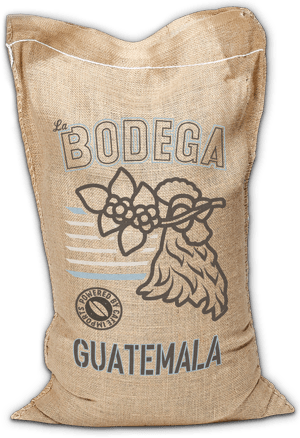Guatemala – FTO Women Producers – Huehuetenango – ASPROCDEGUA – FLO ID 37849 B16751
Specs:

Source:
Guatemala
Region:
Cuilco, Colotenango, Santa Bárbara, San Sebastián Huehuetenango, Sipacapa, San Antonio Huista, Unión Cantinil, San Pedro Necta, Todos Santos, Concepción Huista, San Marcos
Farm:
Various women smallholder farmer members of ASPROCDEGUA
Variety:
Bourbon, Caturra, Catuai, Pache
Altitude:
1600–2200 masl
Processing:
Washed
Program:
Women Coffee Producers
Notes:
"Sweet and smooth with tart fruit acidity, toffee, lemon and chocolate flavors."
Score:
Price/Bag:
$5.11 per lb
$225.00 per bagOut of stock
Background:
Asociación de Productores de Café Diferenciados y Especiales de Guatemala (ASPROCDEGUA) is a producing organization that was founded by a master cupper named Noe Quintero, with whom our green-coffee buyer Piero Cristiani has worked since his first year on the sourcing team. There are 664 contributing members, 394 of whom have organic certification. The producing members own small farms, an average of 2 hectares each, on which they plant coffee as well as other crops for diversification, including bananas, citrus fruit like oranges and lemons, avocado, guava, and cassava.
The organization offers its members access to technical assistance and routinely provides services such as soil analysis, test farms, and social projects based on food security, education, and nutrition. The smallholders of ASPROCDEGUA are from several different municipalities within the area, including San Marcos, Cuilco, Colotenango, Santa Bárbara, San Sebastián Huehuetenango, Sipacapa, San Antonio Huisa, Cantinil Union, San Pedro Necta, Todos Santos, and Concepción Huista.
The women’s association is not a formal sub–co-op, but the premium earned for their Women Coffee Producers lots goes toward organic fertilizer distribution to the women farmers, among other benefits. In 2020, the premium was used to purchase dairy cows for the women, which were distributed to both augment their household nutrition and to give them better access to organic matter from which to make their own organic compost.
For more information about coffee production in Guatemala, visit our Guatemala page.
Recommendations
-

Bolivia – FTO La Paz – La Cooperativa Corpus Cristhy Illampu R.L – Red Catuai & Typica – FLO ID 3645
$ 5.14 per lb Add to cart -

Brazil – Organic Cascara – Cascara Tea – Espirito Santo – Fazenda Camocim – Biodynamic
$ 15.87 per lb Add to cart -

Burundi – Microlot – Gakenke – Kayanza – Washed
$ 6.05 per lb Add to cart -

Colombia – Decaf Origin Select – EA Decaf de Cana – Huila
$ 5.27 per lb Add to cart
